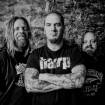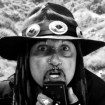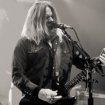There are many reasons why heavy-music fans hail Corrosion of Conformity. They've produced some truly iconic songs, including "Albatross," "Clean My Wounds," "Drowning in a Daydream," to name just a few. Late drummer Reed Mullin's frenetic powerhouse style was undeniable, and then there's the harmonious stoner riffs of guitar tandem Pepper Keenan and Woody Weatherman. But you know what isn't regularly touted when fans congregate about Corrosion of Conformity? Predictability.
The hardcore/punk crossover pioneers from Raleigh, North Carolina, came together nearly 40 years ago, and throughout their career have gone through a seemingly endless string of lineup and stylistic changes — rarely keeping their sound or roster intact from album to album. This, according to longtime guitarist and vocalist Pepper Keenan, is somewhat by design.
"Listen, if we just decided to play the same songs over and over and never evolve, we wouldn't be having this conversation," he says. "We would have been dead in the water years ago."
Corrosion of Conformity (or C.O.C., as they were known during their initial mid-Eighties hardcore period) have certainly endured their share of upheaval and hardships (including the January 27th, 2020, death of Mullin). But they are far from dead in the water. And the reason for today's conversation with Keenan is to celebrate the 30th anniversary of 1991's Blind.
Corrosion of Conformity's third full-length was a pivotal moment for the band. Not only was it Keenan's first outing with C.O.C, it also served as a stylistic bridge between the early hardcore fury of 1984 debut Eye for an Eye and its follow-up Animosity and the grimy Skynyrd-meets-Sabbath sound of later works including Deliverance, Wiseblood and America's Volume Dealer that would earn the band mainstream recognition throughout the Nineties and beyond.
"Blind was a very transitional album for us, and that was the fun part of it," says Keenan during a lengthy phone conversation from Le Bon Temps Roule, the bar he owns in New Orleans. "It was really uplifting to throw all the previous shit out the window and just go for it."
The first thing to get chucked out the window were the relentless punk-rock numbers that rarely clocked in at longer than two minutes. In their place, C.O.C. introduced dynamic songs with hooks, choruses, memorable solos, and varying lengths, tempos and moods — epitomized on Blind standouts "Damned for All Time," "Dance of the Dead" and the breakout hit "Vote With a Bullet." A genuine and mature hard-rock record, Blind ushered in a new era for Corrosion of Conformity and established a sound and style the group continues to explore to this day.
"Blind is a pretty well-rounded record," says Keenan. "That album was what told us that we could go in any direction we wanted to. It sent us on our way."
WHAT WERE THE CIRCUMSTANCES SURROUNDING YOU MOVING FROM NEW ORLEANS TO RALEIGH IN 1989 AND JOINING C.O.C.?
PEPPER KEENAN I was around 17 or 18 and this girl I went to high school with was from North Carolina and knew Reed — she suggested that I try out as C.O.C.'s singer. I was in a band called Graveyard Rodeo at the time, and I didn't even sing, but for some reason she thought I would be a good singer. I had gotten to know the guys in C.O.C. because they were always playing shows in the area, and Reed sent me a demo of some songs they were working on. I would be in the Graveyard Rodeo practice room secretly trying to figure out how to play the songs and practicing my singing.
So I drove up to Raleigh and tried out as singer, but I was a better guitar player at the time. After hanging out with the guys a bunch, we talked about just twisting things up and making it a double-guitar onslaught kind of thing with me and Woody. So Reed let me borrow the C.O.C. graffiti van so I could drive back to New Orleans, pack up my shit and move to North Carolina. The truth is, it was hard to play some of those older C.O.C. songs and sing at the same time, so we decided to keep looking for a singer.
WHAT DO YOU RECALL ABOUT YOUR EARLY DAYS IN RALEIGH WHEN THE BAND WAS STARTING TO WORK ON MATERIAL FOR BLIND?
I was living in Reed's house and we would go to the jam room and practice for like eight hours a day. I wasn't from Raleigh and didn't know many people, so I just played guitar all day. Then we'd wind up at Denny's late at night eatin' club sandwiches and French fries and shit, and talking about what we wanted to do as a band. We were really trying to [create] something that kinda didn't exist — just spazzing out on guitar and drums and writing these weird, furious songs that were just … different, especially from where C.O.C. came from. We were just trying to figure it all out, but we were kinda stagnant because we didn't have a singer.
WHAT WERE YOUR IMPRESSIONS OF REED AT THAT TIME?
He was just … Reed. He was this guy who was in the scene and networked with everyone before the internet — just constantly talking to people and other bands all over the United States. His parents owned a little company, and he would go to their business and call anybody in the country for free. He was trying to keep something alive, and was really one of the best people at it. He knew everything and everybody — if a band needed a player, he'd suggest someone. He could be a pain in the ass, and would aggravate the shit out of people at record labels — "We got a new demo, you gotta check it out!" — but he could play the dog shit out of the drums.
In our world, I don't think there was a better drummer than Reed. His idol was Ian Paice from Deep Purple, but he understood Discharge and Deep Purple equally. The big thing with Reed was that his pocket was so deep that he could stay in a groove and not float, not drift, not lose timing or anything. Especially back in the early days, that was a big deal. So it was always very fun and very challenging when he and I would be in the jam room at 11:00 at night just going at it — both sweating bullets and laughing our asses off.
HOW DID KARL AGELL WIND UP JOINING THE BAND AS SINGER?
We had tried out a bunch of singers prior to finding Karl, but nobody was quite there. Our thing was that you really had to like ZZ Top and Black Flag and Black Sabbath and be able to sit in a van for six straight weeks. And it was hard to find a singer at that time who understood all that. It wasn't like you could bring in just anybody — you had to really get along with him. And C.O.C. was already a pretty good underground band, so we had to step outside of our own little world and find someone other than Willie from next door to come sing.
Because North Carolina was so isolated, we put ads in papers like the Village Voice and LA Weekly that said something like, "Looking for someone into Deep Purple and Black Flag," that kinda thing — but we didn't say it was for C.O.C. Karl, who was from Sweden but lived in New York City, answered the ad. He was in a band called School of Violence at the time. Karl came down to Raleigh. He was a vegan with long hair, and he understood our political side, so everything just kinda matched up. He joined the band and we started working on the Blind record.
C.O.C. WAS A VERY DIFFERENT BAND BEFORE BLIND. WHAT WERE THE CONVERSATIONS LIKE AFTER YOU JOINED THAT LED TO THE BAND'S SOUND CHANGING ON BLIND?
We had lots of conversations about not painting ourselves into a corner and doing the same thing over and over. C.O.C. was evolving constantly from Eye for an Eye to [1985 EP] Six Songs with Mike Singing. For us, it was more punk-rock to step outside of your boundaries rather than placate the converted — it just seemed really boring to us to keep doing the same thing. A lot of the bands we were playing with at the time were just running in circles. But we kinda saw the writing on the wall and knew that we had to keep pushing and evolving. We knew we could either make a Discharge record since that was the world we were in, or we could just throw it out the window and go for it.
YOU GUYS HAD BECOME FRIENDS WITH PRODUCER JOHN CUSTER BEFORE GOING UP TO NEW YORK CITY TO RECORD BLIND. WHAT KIND OF IMPACT DID HE HAVE ON THE BAND'S SOUND?
Custer was the game-changer for us. He was this crazy dude, and not really a record producer at the time, but his skills were huge — he made amazing four-tracks. He would come and hang out at our place called the Wake Shop. He'd bring over cassettes of things he had done that kinda sounded like C.O.C. — on his own with a drum machine and shit. And we were like, "This guy's a motherfucker." He's the one that started showing us the Brian May/Queen stacking-harmonies shit and all things we, as a two-guitar band, were trying to get into and do something different with. So once he was in the game, and we started searching for singers, it kind of evolved from there.
AFTER SIGNING WITH RELATIVITY, THE BAND WENT TO NEW YORK CITY IN EARLY 1991 TO TRACK BLIND. WHAT LED TO YOU RECORD IN THE BIG APPLE?
It was actually cheap to record in New York City, and we were there for months — it was better for us to spend a long time tracking the album than it was to go to a fancy studio and have to whack it out in three days because of the budget. Relativity didn't have any money, so we were just staying in some halfway house with no air conditioning in the fucking Bowery. We'd get up at noon and get Chinese food before getting on a bus and heading to the studio. It was a brutal experience, but the studio was great. We couldn't have recorded that album in a place like Raleigh because we needed gear. Woody and I just had two shitty Gibson SGs and a Mesa/Boogie .50 Caliber Plus with a graphic EQ. Reed had his classic Tama kit, which he used from Eye for an Eye all the way until the end. The same beat-to-shit drum kit. That thing paid for itself a thousand times over.

I had broken my hip and femur bone at a Pantera show about a month before we went to New York. I had 13 screws in my femur bone. So I recorded the album and spent our time in New York City in a wheelchair. Woody would be pushing me down 14th Street in a wheelchair — it was brutal. If you look at the Blind record, there's a picture of us in a hotel room or something, and there's a crutch leaning up against the wall. In the back of the picture I'm holding a cane.
WHAT WAS THE BLIND RECORDING PROCESS LIKE?
Not to be weird, but I kinda look at the whole Blind record as a jerk-off session — just guys going apeshit. And it was all analog — you weren't punching shit in and there was no automation, so it was hard. It was all on tape, so it had to be on point. With Custer at the helm, we created something different, but something that sounded like us.
"VOTE WITH A BULLET" WAS THE BREAKOUT HIT FROM BLIND, AND ALSO FEATURED YOU ON LEAD VOCALS FOR THE FIRST TIME. HOW DID THAT SONG COME ABOUT?
I wrote "Vote With a Bullet" and sang it by myself in the studio in secret. Custer was with me, but Karl didn't know about it, and he wasn't that happy when he found out. But the phrasing of that song and the fact that it was so pissed off … if someone else sang it, it wouldn't have sounded right.
I wrote "Vote With a Bullet" to go behind "Shallow Ground," the little open-tuned instrumental that was actually the first time we did one of those little interludes that break up the pace of a record. A lot of bands back then were just pummeling people and making records that were the same all the way through. But we wanted to make a fucking album, one that ebbs and flows. I like writing those little tearjerkers — like you suddenly drop the testosterone level, and now you gotta build it back up. Doing that with "Shallow Ground" and "Vote With a Bullet" was a really fun experiment that we still do to this day.
UPON ITS RELEASE IN NOVEMBER 1991, BLIND WAS RECEIVED WELL BY THE MUSIC MEDIA AND, FOR THE FIRST TIME EVER, CORROSION OF CONFORMITY SONGS — SPECIFICALLY "DANCE OF THE DEAD" AND "VOTE WITH A BULLET" — WERE PLAYED REGULARLY ON THE RADIO.
The record was definitely well received. It was making waves in the old scene — but New York City was still a scary place for us to play. People would be yelling at us, "You fucking sellouts!" Then we'd go to Germany and everything would be fine. But the backlash was small compared to the gains we made with Blind. I knew that we were onto something. We were just a bunch of dudes from North Carolina and one dude from New Orleans and it was really fun to understand that the love of music was more important than being in a scene. I mean, Reed liked Gang of Four as much as he liked Venom. Woody and I like Neil Young. We like Lynyrd Skynyrd. If you can take the old attitude you got and bring it with you, you're gonna win — and even if you don't win, who gives a fuck?








